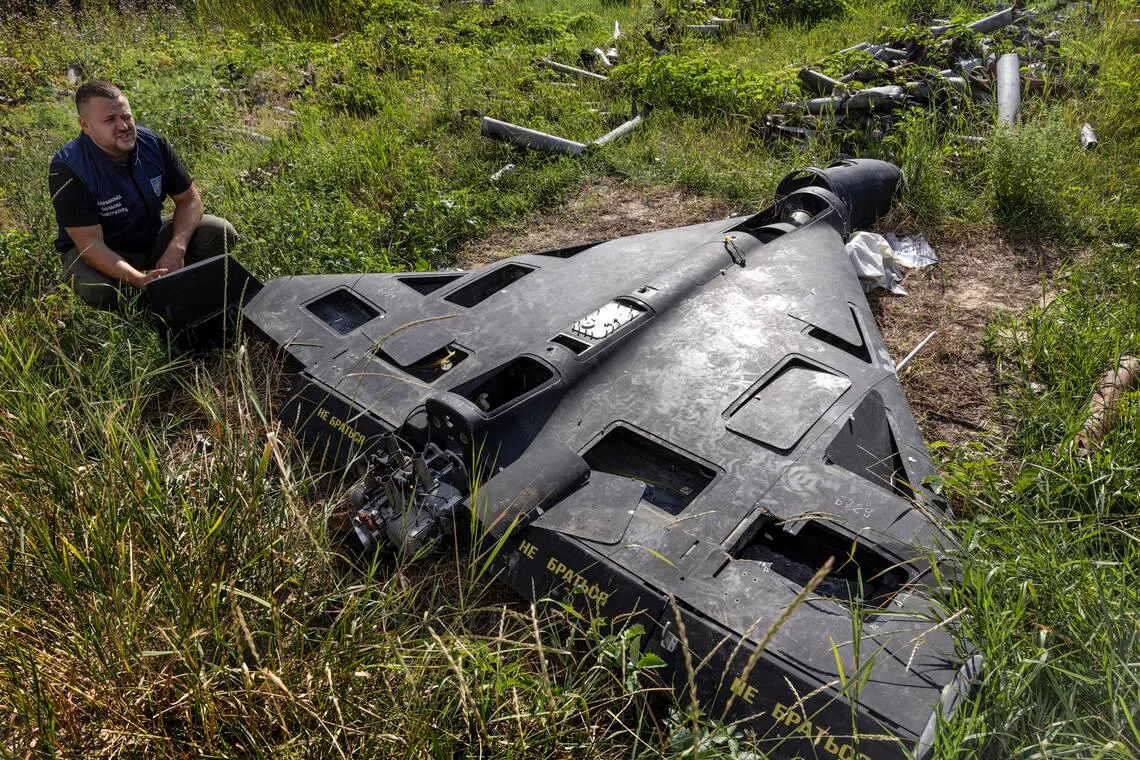Ukraine advances security talks with allies, vows to keep hitting Russian energy
Sign up now: Get ST's newsletters delivered to your inbox

A Ukrainian official next to a downed Russian drone at a “graveyard” for war ordnance in the Kharkiv region of Ukraine, in July 2025.
PHOTO: DAVID GUTTENFELDER/NYTIMES
- Ukraine progresses in security guarantee talks with the US and European allies, aiming for legally binding agreements.
- Bilateral US agreement is vital; Trump's commitment to defence is a "breakthrough", providing key logistics and intelligence.
- Ukraine intensifies attacks on Russian infrastructure, a vital tool to pressure Russia toward negotiations, as fighting continues.
AI generated
KYIV – Ukraine is making progress in intensive talks to formalise legally binding security guarantees with the United States and European allies, a key part of its bid to end the war with Russia, First Deputy Foreign Minister Serhii Kyslytsia said.
A bilateral agreement with the United States remains vital, and US President Donald Trump’s recent commitment to participate in Ukraine’s defence
“I think that we are making progress,” said Mr Kyslytsia, a key negotiator with allies on security guarantees who also participated in all three rounds of direct talks with Russia in Istanbul earlier in 2025.
“I think this very intense period of exchange of views allows us to have a much better and concrete understanding of who is willing to do what and who is capable of doing what.”
His views reflect an increasingly pragmatic approach to diplomacy in Kyiv, which is not holding out for a quick fix to end the war either in the shape of punitive US sanctions against Moscow or a sudden collapse of the Russian economy.
He said the vast majority of around 30 countries in the so-called “coalition of the willing” promising support for Ukraine had offered practical help, although details were still being thrashed out.
Ukrainian officials have said proposals under discussion as part of security guarantees include a strong, well-equipped Ukrainian army, foreign troops on the ground, finance for domestic and overseas weaponry and intelligence sharing.
The aim is to create a credible deterrent against future Russian aggression, although participating countries differ widely in what they are prepared to contribute and Mr Kyslytsia said that more progress needs to be made.
He also had a stark warning for European allies: Russian President Vladimir Putin will not stop his military aggression at Ukraine’s border, and the time for bold action is now.
“If Europeans are serious about their security, they have to take difficult decisions.
“I think it’s the duty of European politicians to go to their constituents, and... explain to every household... why their well-being depends on the ability of Ukraine to defend itself and to defend the entire continent.”
US help vital
He called the Europeans Kyiv’s “best friends”, but said cooperation with the US was key because it provided logistical and air support as well as intelligence that would be crucial to Ukraine’s long-term security.
Mr Kyslytsia said there was still a decision to be made on whether Kyiv would have a set of bilateral treaties with its European allies or a multilateral agreement among several countries.
Whatever the format, future guarantees should be legally binding and adopted by national parliaments.
After more than 3½ years of war, polls show increasing exhaustion in Ukraine and support for a potential ceasefire, but there remains overwhelming opposition to Russian demands to give up occupied land and to cede yet more territory.
Ukraine’s intense diplomatic push is occurring as its forces face increasing pressure in the east and south, where the Russian military is advancing slowly but steadily and threatening a series of strategic garrison towns.
Outmanned on the battlefield, Ukraine has intensified its attacks on Russia’s oil refineries and energy infrastructure
It remains Ukraine’s single most effective way of inflicting significant damage on the Russian economy.
“I think we will continue to do that as long as Russia is not showing any meaningful signs of readiness to sit down and negotiate,” Mr Kyslytsia said.
“I don’t believe that Russia will collapse economically in the foreseeable future, but I think that the pain for the regime should increase.” REUTERS


